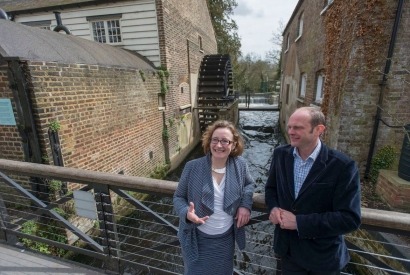
The Trust will invest nearly £3.5 million in five pilot projects, including hydro, biomass and heat pumps, during 2013/14.
“Through our work we show that renewable technologies can be made to work in some of the country’s most sensitive landscapes and historic environments,” said Patrick Begg, Rural Enterprises Director at National Trust.
“Like householders everywhere we are facing rising energy bills. We spend more than £6 million each year heating and powering the places in our care,” he continued. “By investing in renewable energy production we can reduce our energy bills and invest more in vital conservation work around the country. It will put renewable energy at the heart of conservation.”
If the pilot is successful, the Trust expects to spend ten times that sum in a programme that will see it generate 50 per cent of its energy from renewable sources and halve its fossil fuel consumption by 2020.
This will enable it to reduce its energy costs by more than £4 million per annum, releasing more money for the charity’s conservation work.
The National Trust’s four million members will also be able to support the programme by signing up for renewable electricity with the charity’s energy partner, Good Energy. The company will pay the Trust £40 per year for each new customer signing up to its dual fuel tariff via the National Trust.
If 5 per cent of member households adopted the tariff it would raise £3.8 million for investment in a low carbon future and see 95,000 households powered by clean, green renewably sourced electricity.
“Britain is blessed with abundant sources of natural power and we hope people will be inspired when they see how National Trust properties can generate renewable power in harmony with the environment,” said Juliet Davenport, CEO of Good Energy. “Together we hope to inspire people to switch to green electricity, reduce their energy usage and if possible generate their own renewable power at home.”
Good Energy is helping the Trust develop its renewable strategy, using its expertise in generating power from natural sources and its experience of supporting more than 46,000 small and medium sized renewable energy generators in the UK.
The National Trust spends nearly £6 million a year to heat and power its estate - 300 major historic houses, plus office buildings, visitor centres and 360 holiday cottages - and without action it forecasts that rising oil and gas prices would take this to £7.5 million by 2020.
However, the renewables investment programme is expected to reduce operational energy costs by £4.3 million from 2019 and provide an expected 10 per cent return on investment, thanks to lower fuel costs and schemes such as the Feed-in Tariff and Renewable Heat Incentive.
The Trust’s five pilot projects this year will trial a multi-site approach and prove business models:
If the trial phase is deemed successful, the National Trust plans 38 further schemes tailored to individual properties and selected according to strict criteria.
Patrick Begg continued: “Projects must offer strong financial returns, build energy independence and energy security, but also respect properties’ settings and historical significance, and improve conservation, wherever possible.
“A major focus of the programme will be to dramatically reduce the Trust’s reliance on oil from 20 per cent to 3 per cent. This not only protects it from volatile and rising prices, but also reduces the risk that oil spills will pollute water courses, gardens and buildings. Two of the trial properties, Plas Newydd and Ickworth, are the Trust’s largest users of fuel oil.”
The National Trust has been making steady progress pioneering the use of renewable technologies across the places it looks after.
Over the last decade more than 150 schemes have been installed across a wide range of technologies: wood (biomass), solar electricity and hot water, small-scale wind, hydro-electric, and heat pumps.
Following the development of these projects, there is now widespread recognition of the value and impact which well-built renewables initiatives can bring to local National Trust businesses.
This investment programme is part of a move to invest beyond small impact renewables towards larger-scale initiatives, which can make a greater contribution towards meeting local and national goals, as well as generating income for the Trust.
Photo caption: Patrick Begg, National Trust Rural Affairs Director, and Juliet Davenport, CEO of Good Energy, launching the National Trust's renewables strategy at the UK's most energy-efficient historic building, the 19th century Stable Yard, Morden Hall Park, South London.
For additional information:

